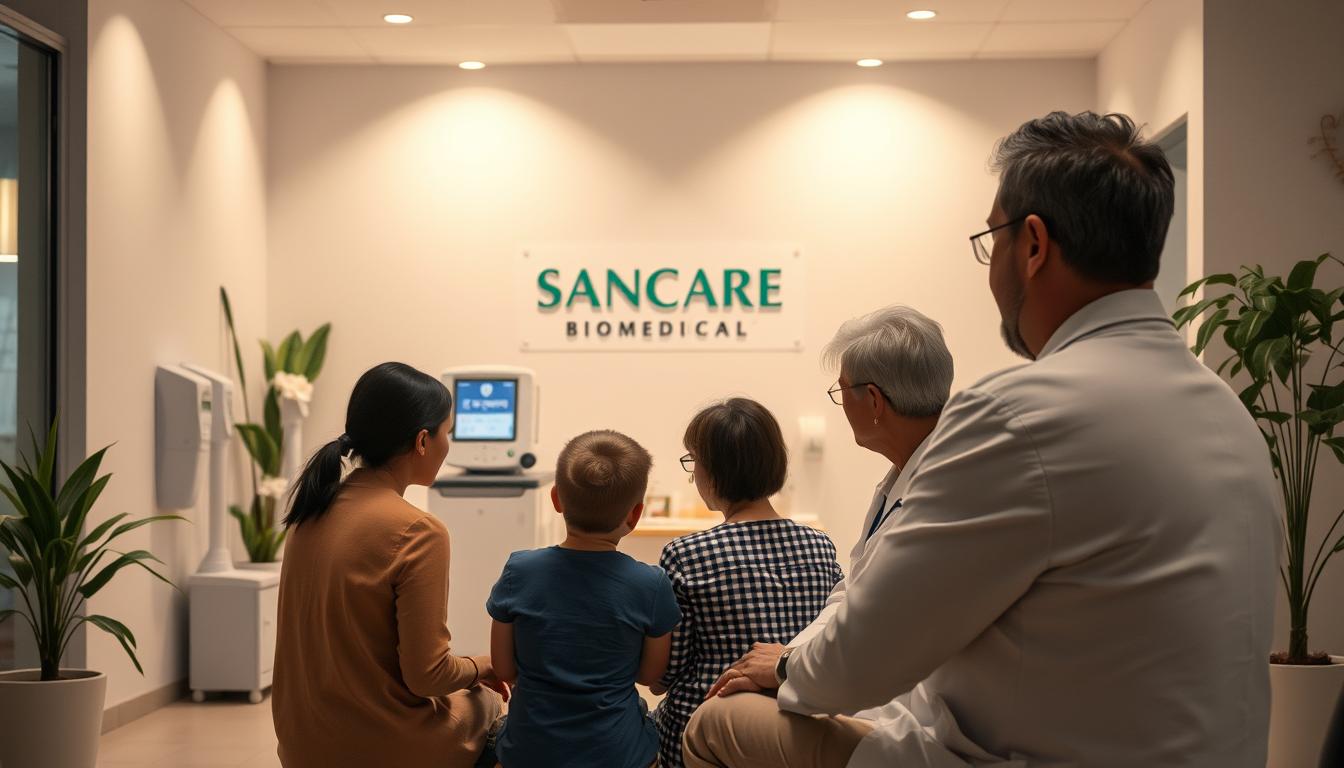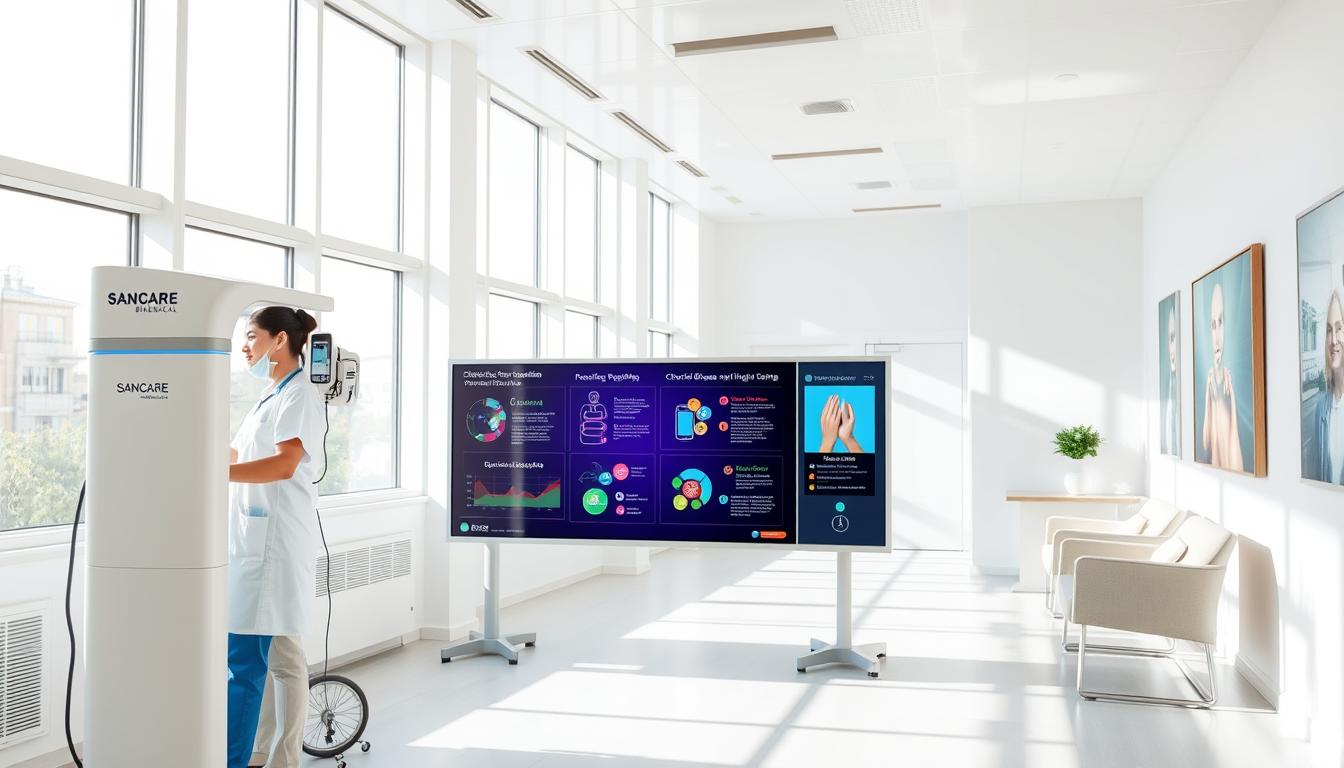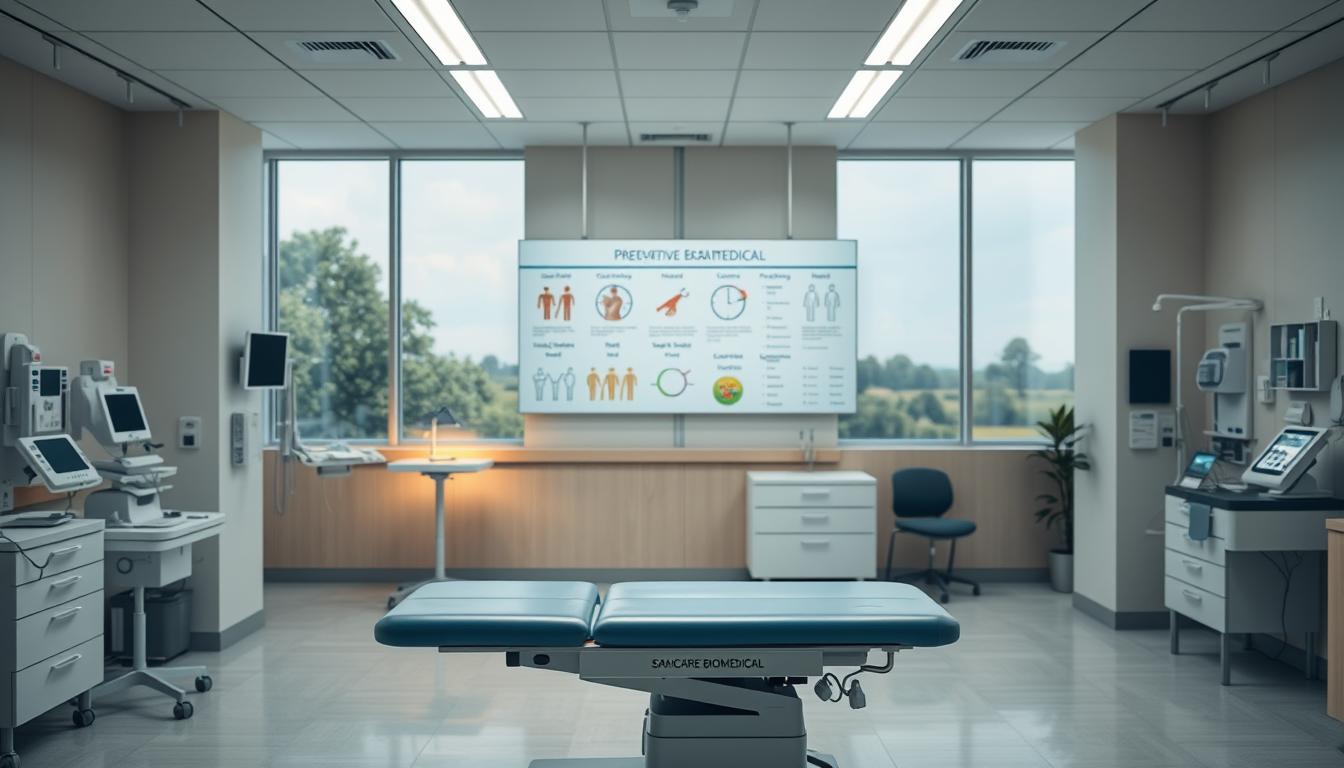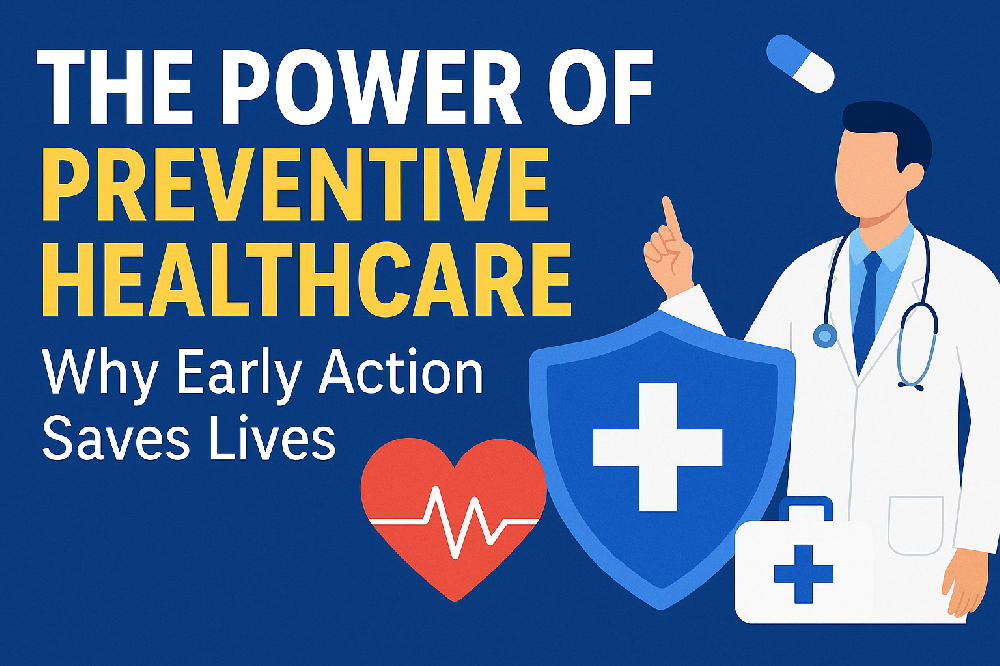In a world where chronic diseases are on the rise and healthcare costs are soaring, taking early action is more crucial than ever.

Preventive healthcare is a powerful approach. It focuses on early intervention over late-stage treatment. This saves lives and improves overall well-being.
By focusing on health awareness and adopting preventive care strategies, individuals can significantly reduce their risk of developing life-threatening illnesses.
Key Takeaways
Early action in healthcare can save lives and reduce costs.
Preventive care strategies are crucial in today's fast-paced world.
Health awareness is key to adopting preventive healthcare measures.
Preventive healthcare improves overall well-being.
Reducing the risk of chronic diseases is a significant benefit.
The Fundamentals of Preventive Healthcare
Understanding preventive healthcare is key to seeing its impact on health. It's a medical approach that aims to stop diseases before they start, not after.
Definition and Core Principles
Preventive healthcare includes many practices and technologies to stop disease before it happens. It focuses on healthy lifestyles, early disease detection, and ways to lower risk factors.
Medical technology has greatly improved preventive care. It helps find and treat diseases early. Vaccines, screenings, and health education are big parts of preventive care.

| Core Principle | Description | Example |
|---|---|---|
| Healthy Lifestyles | Promoting behaviors that reduce disease risk | Diet and exercise programs |
| Early Detection | Identifying diseases at an early stage | Cancer screenings |
| Risk Reduction | Interventions to minimize disease risk factors | Vaccinations |
Historical Evolution of Preventive Care
Preventive healthcare has changed a lot over time. From ancient times of quarantine to today's public health advances, it has grown a lot.
Important steps include the making of vaccines, better sanitation, and finding out what causes diseases. These steps have greatly lowered death rates and improved quality of life.
Now, preventive healthcare keeps up with new health issues. It uses new technologies and strategies to meet changing health needs.
Why Preventive Healthcare Matters More Than Ever
In today's fast-paced world, lifestyle changes and new disease patterns are common. Preventive healthcare is key to keeping us healthy. It's more important than ever to take steps to prevent diseases before they start.
Modern Lifestyle Challenges
Our modern lives often mean sitting too much, eating poorly, and feeling stressed. These habits raise our risk of chronic diseases. It's vital to focus on chronic disease prevention now more than ever. With our busy lives, we need easy and effective ways to stay healthy.

The Shifting Disease Burden Globally and in Nigeria
Worldwide, diseases like diabetes and heart disease are becoming more common. In Nigeria, these diseases add to the challenges of fighting infectious diseases. Making healthcare accessibility better for prevention is essential to tackle these issues.
In Nigeria, we need strong preventive healthcare plans. These should tackle both NCDs and infectious diseases. This will help improve health outcomes for everyone.
The Three Pillars of Preventive Healthcare
Preventive healthcare has three main parts: primary, secondary, and tertiary prevention. These elements work together to keep us healthy and manage diseases.
Primary Prevention: Stopping Disease Before It Starts
Primary prevention stops disease before it happens. It includes:
Using vaccines and following immunization schedules to fight off diseases.
Making healthy choices like eating well, staying active, and avoiding harmful substances.
Vaccination Programs and Immunization Schedules
Vaccines are key in primary prevention. By getting vaccinated, we lower our risk of serious diseases. Vaccines also help protect others who can't get vaccinated.
Lifestyle Modifications for Disease Prevention
Changing our lifestyle can prevent many diseases. Simple steps like eating right, staying active, and avoiding harmful substances can lower our risk of heart disease, diabetes, and some cancers.

Secondary Prevention: Early Detection Strategies
Secondary prevention finds diseases early, before symptoms show. It includes regular health checks. Finding diseases early can lead to better treatment outcomes for conditions like cancer, high blood pressure, and diabetes.
Regular screenings for cancer, like mammograms and colonoscopies.
Checking blood pressure and cholesterol to keep the heart healthy.
Tertiary Prevention: Managing Existing Conditions
Tertiary prevention manages diseases after they start. It includes:
Improving treatment plans for long-term conditions like diabetes and asthma.
Rehabilitation programs to help recover from illness or injury.
By using these three pillars, we can improve our health and quality of life.
Essential Preventive Screenings Across the Lifespan
Preventive screenings are key in healthcare, from childhood to old age. They help find problems early, leading to better health outcomes. This is true for all age groups.
Childhood and Adolescent Screenings
Children and teens need regular checks to spot issues early. These include vision and hearing tests, growth monitoring, and vaccinations on schedule. It's also important to screen for mental health problems like depression and anxiety.
Adult Preventive Care Recommendations
Adults focus on catching chronic diseases early. They should get blood pressure checks, cholesterol screenings, and cancer screenings like mammograms and colonoscopies. It's also key to screen for diabetes and mental health conditions.
Geriatric Preventive Health Measures
Older adults need screenings to stay healthy and independent. They should get osteoporosis screenings to avoid fractures, cognitive function assessments for dementia, and cancer screenings. Regular vision and hearing loss checks are also vital for quality of life.
Healthcare providers tailor screenings to each person's age and risk. This targeted care boosts wellness and cuts down on disease across life.
The Economic Impact of Preventive Healthcare
Preventive healthcare does more than just improve health. It also saves money. By focusing on prevention, everyone can spend less on healthcare and work more efficiently.
Cost-Benefit Analysis for Individuals and Families
Preventive care can save a lot of money for families. Regular health checks and screenings can stop expensive treatments later. For example, vaccines prevent diseases, saving on treatments.
Early detection of diseases through screenings can also save money. It leads to better and cheaper management of these diseases.
Preventive care also means less time off work or school. This keeps everyone healthy and boosts productivity. It helps families and individuals stay financially stable.
Economic Benefits for Healthcare Systems
Healthcare systems also gain a lot from preventive care. It lowers the cost of treating chronic diseases and prevents hospital stays. This makes healthcare more affordable and improves care quality.
Preventive care also helps use resources better in healthcare. It focuses on prevention, making care more effective and efficient. This reduces waste and improves health outcomes, making healthcare delivery better and more cost-effective.
Health Outcomes: Measuring the Success of Preventive Care
To see how well preventive care works, we need to look at health outcomes. We can understand its success by checking how it affects death rates and life quality.
Mortality Reduction Statistics
One key sign of preventive care's success is its role in lowering death rates. Preventive screenings and early treatments help cut down deaths from heart disease and some cancers.
A study showed that regular breast cancer screenings can lower death rates by up to 20%.
Starting treatment early for high blood pressure has helped lower deaths from strokes.
These numbers highlight how vital preventive care is. It saves lives and eases the load on healthcare systems.
Quality of Life Improvements
Preventive care does more than just lower death rates. It also boosts life quality for people. By stopping or managing long-term health issues, folks can live more active and happy lives.
Vaccines and promoting healthy living cut down on infectious diseases.
Early spotting and handling of chronic diseases like diabetes help people stay independent and healthy.
These life quality boosts show the wide-ranging benefits of preventive care. They make life longer and better, not just longer.
Preventive Healthcare in Nigeria: Challenges and Progress
Nigeria is working hard to improve its preventive healthcare. The country has made some big steps forward, but it still faces many challenges. Preventive care is key to Nigeria's healthcare growth.
Current State of Preventive Services
In Nigeria, you can find both old and new ways of preventive care. Despite the hurdles, efforts to make healthcare better are ongoing. For example, the government and groups like NGOs are working together. They aim to improve public health through vaccinations and teaching people about health.
Here's a look at some preventive services in Nigeria:
| Service | Description | Coverage |
|---|---|---|
| Immunization Programs | Vaccination against major diseases | National |
| Health Education | Public awareness campaigns on healthy practices | Regional |
| Screening Services | Early detection for diseases like diabetes and hypertension | Urban Areas |
Success Stories in Nigerian Preventive Care
Nigeria has seen great success in preventive care, especially in immunization. The National Immunization Programme has helped more people get vaccinated. Also, efforts to help mothers and children have led to fewer deaths.
Areas Needing Improvement
Even with progress, there's still a lot to do. One big issue is healthcare accessibility, especially in rural areas. These places often lack good healthcare. It's important to work on preventive care strategies and improve public health infrastructure to tackle these problems.
The Digital Revolution in Preventive Healthcare
Health tech innovation is changing how we get preventive care. Digital health solutions are making care better and more accessible. They help both individuals and healthcare providers be more proactive and personal in their approach to prevention.
Wearable Technology and Health Monitoring
Wearable tech is key in modern preventive care. Smartwatches and fitness trackers let us monitor our health all the time. They track heart rate, blood pressure, and activity levels.
Key Features of Wearable Health Technology:
Continuous heart rate monitoring
GPS tracking for physical activity
Alert systems for abnormal health readings
A health tech expert says, "Wearables are not just gadgets; they're gateways to a more proactive approach to health management." The integration of wearables into daily life signifies a shift towards preventive care.
Mobile Health Applications
Mobile health apps are also vital in the digital health revolution. These apps do many things, like schedule appointments and remind you to take meds. They also give personalized health advice and support for mental wellness.
| Feature | Description | Benefit |
|---|---|---|
| Appointment Scheduling | Easy booking of healthcare appointments | Increased access to care |
| Medication Reminders | Timely reminders for medication intake | Improved adherence to treatment |
| Personalized Health Advice | Tailored guidance based on user data | Enhanced health management |
AI and Predictive Analytics in Disease Prevention
Artificial Intelligence (AI) and predictive analytics are changing preventive healthcare. AI looks at big data to find patterns and predict disease. This helps catch problems early.
"AI-driven predictive analytics has the potential to revolutionize disease prevention by identifying high-risk individuals and tailoring interventions accordingly."
The mix of digital health solutions, health tech innovation, and medical technology is changing preventive care. As these technologies improve, they will have a bigger impact on our health.
Innovative Companies Transforming Preventive Care
Innovative companies are leading the way in changing preventive care. They use the newest health tech innovation and medical technology. This is changing how we see healthcare.
These companies are making current preventive care better. They are also starting new ways to care for us. These new methods are more effective, easier to get, and tailored to each person.
Sancare's Contributions to Smart Healthcare in Nigeria
Sancare is a top company in Nigeria's preventive healthcare. They create smart healthcare solutions. This makes preventive care better and more available.
They use digital platforms for personalized health advice. This helps catch problems early.
Other Pioneering Organizations in the Field
Other companies are also changing preventive care. They use AI, wearable tech, and data to stop diseases before they start. Their work is raising the bar in healthcare worldwide.
Their work is not just in Nigeria. They are part of a worldwide push for better, more proactive healthcare.
Barriers to Effective Preventive Healthcare
Preventive healthcare is key, but it faces many challenges worldwide. These obstacles affect different groups in different ways.
Awareness and Education Gaps
Many people don't know about preventive healthcare. This lack of knowledge means they don't use the services available to them.
Education can help. It can teach people about the benefits and how to access preventive care.
Access and Affordability Challenges
Getting to preventive healthcare can be hard. It's expensive and not always close by, especially in poor countries like Nigeria.
We need better healthcare systems and policies. These can make preventive care more affordable and accessible.
Cultural and Social Factors
Culture and social norms play a big role. In some places, people might not trust or accept certain preventive measures because of their beliefs.
Healthcare System Limitations
Healthcare systems also face challenges. They often lack the resources needed for good preventive care. This includes equipment, staff, and money.
Empowering Communities Through Preventive Health Strategies
Community empowerment is key to good preventive healthcare. It makes everyone healthier. By getting communities involved in care, we create a culture of health.
Community-Based Preventive Programs
Community programs are vital for reaching many people. They offer health education workshops, screening events, and outreach initiatives. For example, Sancare's work in Nigeria has greatly improved health.
The Role of Healthcare Providers
Healthcare providers are crucial in preventive care. They give guidance, screenings, and personalized advice. They help people find health information and services.
A healthcare expert said, "Healthcare providers teach patients about preventive care. They encourage healthier lifestyles."
Policy Interventions for Wider Adoption
Good policies help make preventive health common. They support healthcare accessibility and public health initiatives. For instance, health education in schools or incentives for providers can make a big difference.
"Investing in preventive healthcare is not just a moral imperative; it's an economic one. By preventing illness, we can reduce healthcare costs and improve productivity."
Together, community programs, healthcare providers, and policies can empower communities. This way, we can make preventive health a priority.
Personal Responsibility: Creating Your Preventive Health Plan
Preventive healthcare starts with you. Taking charge of your health can lower disease risks and boost your life quality.
Assessing Your Health Risks
Start by checking your health risks. Know your family's health history, your lifestyle, and current health. Identifying risk factors helps you focus on prevention.
Building Healthy Habits
Healthy habits are key. Eat well, exercise often, and stay away from harmful substances like tobacco. Small changes can make big health differences.
Working With Healthcare Providers
Team up with healthcare experts for a solid plan. Regular check-ups and tests catch problems early. Collaborating with your healthcare provider makes your plan fit your needs.
Assess risks, build good habits, and work with doctors. This way, you can manage your health and craft a plan that's just for you.
Conclusion: Building a Future Where Prevention Comes First
Preventive healthcare is key to public health. It saves lives and boosts health outcomes. Understanding its basics and growth helps us see its role in tackling today's health issues.
The three main parts of preventive care are primary, secondary, and tertiary prevention. These are the base of a full health approach. Key screenings at all ages, from kids to seniors, help catch and manage diseases early. This also saves money for both people and healthcare systems.
To make prevention a top priority, we need to focus on health awareness and education. We must also make sure everyone can get preventive care. Using tech like wearables and health apps can also help a lot. Working with healthcare, policy makers, and people, we can make Nigeria a healthier place.
By focusing on preventive healthcare and spreading health awareness, we can lessen disease burdens. This will improve life quality for Nigerians.
Preventive healthcare is about stopping diseases before they start. It helps find problems early and lowers the risk of long-term diseases. It also improves health by changing lifestyles and doing health checks. Preventive healthcare has changed a lot. It used to focus on cleanliness and hygiene. Now, it includes new medical tech, vaccines, and health plans tailored to each person. This change comes from learning more about diseases and risks. The three main parts are stopping disease before it starts, finding problems early, and managing ongoing conditions. These parts work together to offer a full approach to keeping people healthy. Digital health tools like wearables and apps help a lot. They track health, give advice, and spot health risks. This makes preventive care better and more personal. Some big hurdles include not knowing enough, not being able to get care, and cultural and social issues. Also, healthcare systems can be a problem. Fixing these is key to better health care. People can check their health risks and start healthy habits like exercise and good food. They can also work with doctors to make a health plan just for them. This way, they can control their health. Community programs are very important. They offer education, screenings, and help tailored to the community. This helps spread health awareness and encourages people to take care of their health. Preventive care can save a lot of money for healthcare systems. It reduces chronic diseases, cuts down on expensive treatments, and improves health. This makes healthcare more affordable and sustainable.FAQ
What is preventive healthcare, and why is it important?
How has preventive healthcare evolved over time?
What are the three pillars of preventive healthcare?
How do digital health solutions contribute to preventive healthcare?
What are some common barriers to effective preventive healthcare?
How can individuals take personal responsibility for their preventive health?
What role do community-based programs play in preventive healthcare?
How does preventive healthcare impact healthcare systems economically?

 English
English






 Views:55
Views:55








 Address:ROM 03, 24/F, HO KING COMM CTR, 2-16 FAYUEN ST, MONGKOK KOWLOON HONG KONG,CHINA
Address:ROM 03, 24/F, HO KING COMM CTR, 2-16 FAYUEN ST, MONGKOK KOWLOON HONG KONG,CHINA Tel.:+86 15889419706 +234 7048099999
Tel.:+86 15889419706 +234 7048099999 WhatsApp:+234 8164022713 +234 7048099999
WhatsApp:+234 8164022713 +234 7048099999 Email:service@sancare-tech.com
Email:service@sancare-tech.com






